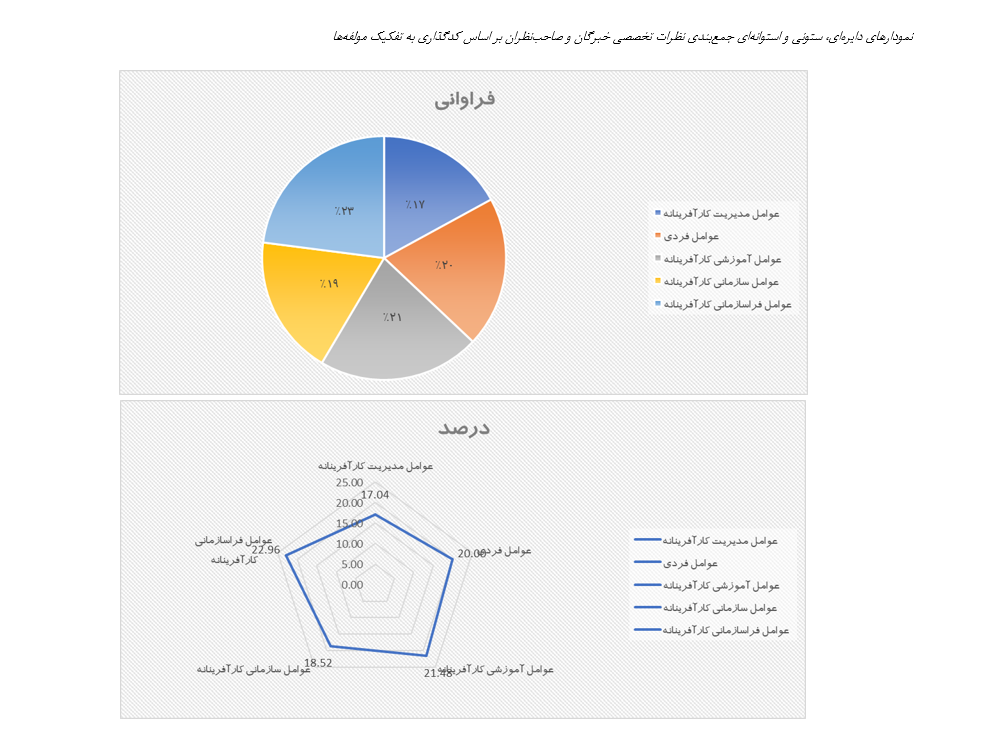Designing an Entrepreneurial Learning Model in Primary Education
Keywords:
Entrepreneurial learning, elementary education, entrepreneurial management factorsAbstract
The present study presents an entrepreneurial learning model in primary education. The research is applied in nature and follows an exploratory method. Data collection was carried out using a mixed-method approach (quantitative and qualitative), with the data collection tools being expert interviews using the Delphi technique and a questionnaire. After the administration of the questionnaire, data analysis in the qualitative section was performed using coding methods (open, axial, and selective), while the quantitative data were analyzed using both descriptive and inferential statistics via SPSS 16 and Smart PLS software. Descriptive statistics, including frequency, percentage frequency, frequency distribution tables, chart creation, and the description of respondent characteristics, were used to describe the data. In the inferential analysis, factor analysis was conducted to analyze the data. The results indicated that the components of entrepreneurial educational factors, organizational entrepreneurial factors, extra-organizational entrepreneurial factors, individual factors, and finally, entrepreneurial management factors, all had factor loadings greater than 0.3 and were therefore not excluded from the factor analysis process. Consequently, all five components, along with their indices, were accepted as the dimensions and components of the entrepreneurial learning model in primary education. The model fit indices in the factor analysis confirm the adequacy of the model fit.
Downloads
References
Abzari, M., & Yazdanshenas, M. (2016). Social Responsibility and Work Ethics in Modern Quality Management.
Management Culture Quarterly, 5(15), 5-42. https://jomc.ut.ac.ir/article_19357.html?lang=en
Ardalan, M. R., Soltanzadeh, V., & Beheshti Rad, R. (2014). Evaluating the Role of Organizational Culture in
Organizational Entrepreneurship. Higher Education Letter, 6(23), 68-79.
https://journal.sanjesh.org/article_14864.html
Budur, T., Demirer, H., & Rashid, C. A. (2024). The effects of knowledge sharing on innovative behaviours of
academicians; mediating effect of innovative organization culture and quality of work life. Journal of Applied
Research in Higher Education, 16(2), 405-426. https://doi.org/10.1108/JARHE-08-2022-0257
Ebrahimpour, H. (2013). The Impact of Functional Performance on Work Ethics (Case Study: Staff of Mohaghegh
Ardabili University). Journal of General Management Research(19), 83-101.
https://jmr.usb.ac.ir/article_1260.html?lang=en
Erabi, S. M. (2013). Explaining the Factors for Entrepreneurs' Success and Presenting a Suitable Model of Success
Factors in Iran's Market. Collection of Discussions and Articles of the First Congress on Entrepreneurship in the
Health Sector,
Givarian, H. (2015). The Role Levels of Ethic on Organizational Decisions. Journal of Tadbir(162).
https://ensani.ir/fa/article/149499/
Hollingsworth, C., Brewer, E. K., & Petty, C. G. (2012). Work Ethic of Extension Educators.
Nazari Ardabili, S. Z., Benisi, P., & Vatankhah, H. (2024). Designing the Maturity Management Model of Educational
Technology in Iranian Schools. Sociology of Education, 10(1), 314-326.
https://doi.org/10.22034/ijes.2024.2022649.1536
Nguyen, M., Sharma, P., & Malik, A. (2024). Leadership styles and employee creativity: the interactive impact of online
knowledge sharing and organizational innovation. Journal of Knowledge Management, 28(3), 631-650.
https://doi.org/10.1108/JKM-01-2023-0014
Salman Al-Oda, A. H., Sadeghi, M., Al-Murshidi, R. H. A., & Sharifi, S. (2024). Investigating the Relationship Between
Talent Management Implementation Categories in the Basra Province Education Organization [Research Article].
Iranian Journal of Educational Sociology, 7(1), 1-9. https://doi.org/10.61838/kman.ijes.7.1.1
Shekh-Abed, A. (2024). Metacognitive self-knowledge and cognitive skills in project-based learning of high school
electronics students. European Journal of Engineering Education, 1-16.
https://doi.org/10.1080/03043797.2024.2374479
Song, H., & Cai, L. (2024). Interactive learning environment as a source of critical thinking skills for college students.
BMC Medical Education, 24(1), 1-9. https://doi.org/10.1186/s12909-024-05247-y
Steinberg, O., Kulakow, S., & Raufelder, D. (2024). Academic self-concept, achievement, and goal orientations in
different learning environments. European Journal of Psychology of Education, 1-25.
https://doi.org/10.1007/s10212-024-00825-6
Tamaddoni, A., & Hoseinkhlezadeh, R. (2024). Identifying the challenges and issues faced by school managers in Iran
compared to global experiences. Journal of New Approaches in Educational Management, 14(5), 20-33.
https://jedu.marvdasht.iau.ir/article_6162.html
Vuorio, J. (2024). Studying the Use of Virtual Reality Learning Environments to Engage School Children in Safe Cycling
Education. Simulation & Gaming, 55(3), 418-441. https://doi.org/10.1177/10468781241246566
Wang, J., Sheng, M., & Song, R. (2024). Enhancing Classroom Behaviors and Creativity: The Impact of a Critical
Thinking Workshop. International Journal of Education and Cognitive Sciences, 5(1), 8-15.
https://doi.org/10.61838/kman.ijecs.5.1.6
Xiu-Juan, F., Xiao-Hui, C., Huan, L., & Xiang-Xiang, L. (2024). Serial multiple mediation of psychological capital and
self-directed learning ability in the relationship between perceived stress and professional identity among
undergraduate nursing students in China: a cross-sectional questionnaire survey. BMC Medical Education, 24, 1450.
https://doi.org/10.1186/s12909-024-06459-y
Yim, I. H. Y. (2024). Artificial Intelligence (AI) Learning Tools in K-12 Education: A scoping Review. Journal of
Computers in Education. https://doi.org/10.1007/s40692-023-00304-9
Yuan, A., & Chayanuvat, A. (2022). A Learning Organization: Conditions for Success of the Excellent Schools in Hunan,
China. Asia Social Issues, 15(5), 252762. https://doi.org/10.48048/asi.2022.252762
Zhang, Y. (2024). Mechanisms of the Impact of Enterprise Digital Transformation on Knowledge Sharing Behavior of
Employees. 1(3), 309-318. https://doi.org/10.62517/jmsd.202412343

Downloads
Published
Submitted
Revised
Accepted
Issue
Section
License
Copyright (c) 2025 Journal of Technology in Entrepreneurship and Strategic Management (JTESM)

This work is licensed under a Creative Commons Attribution-NonCommercial 4.0 International License.










